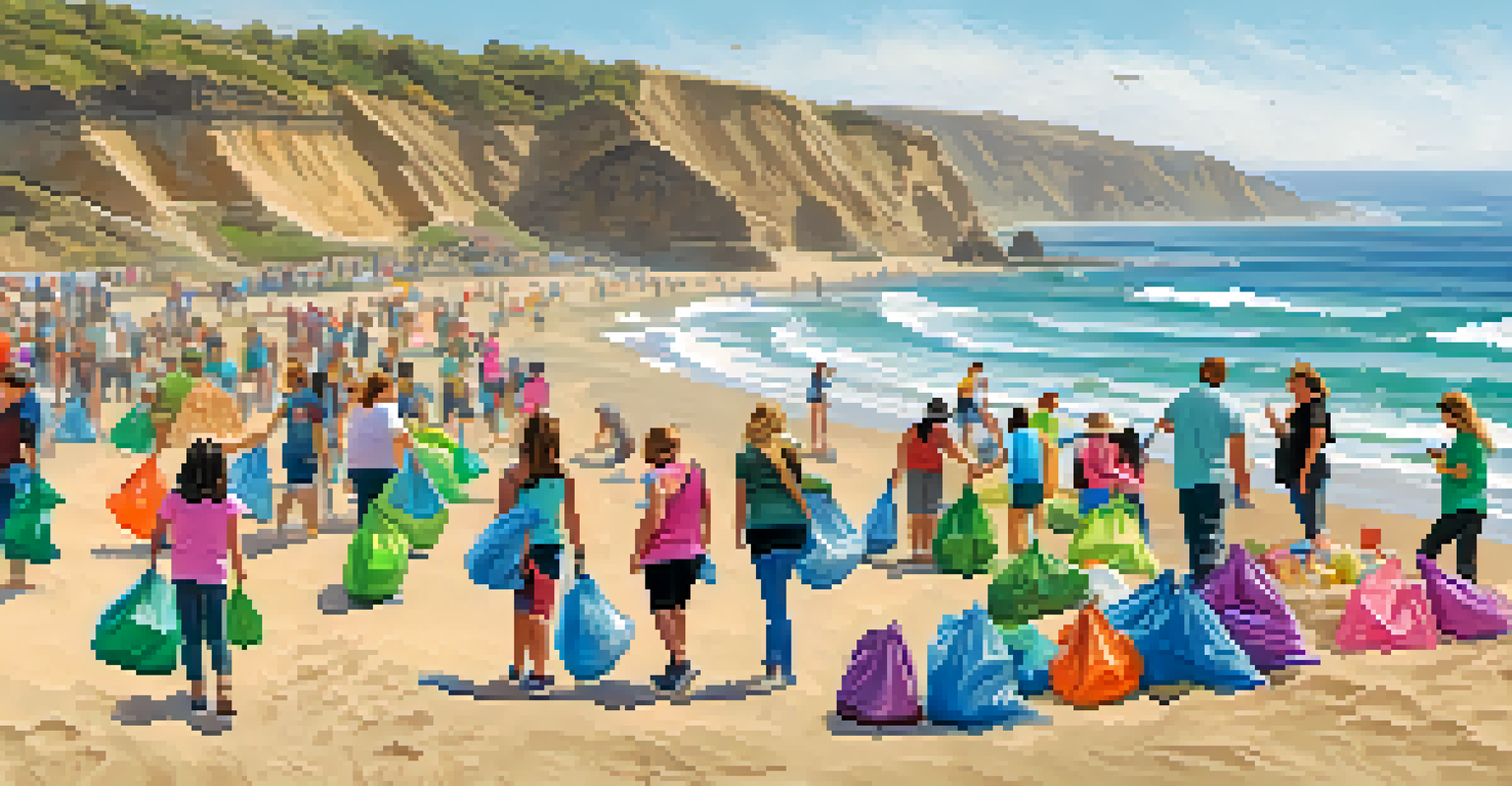Conservation Efforts in Carlsbad: Protecting Coastal Ecosystems

Understanding Carlsbad's Unique Coastal Ecosystems
Carlsbad, California, is home to diverse coastal ecosystems, including sandy beaches, wetlands, and rocky shorelines. These ecosystems provide essential habitats for various species, from migratory birds to marine life. Understanding their unique characteristics is crucial for conservation efforts, as each ecosystem plays a vital role in the overall health of the environment.
In every walk with nature one receives far more than he seeks.
The coastal landscape not only supports wildlife but also offers recreational opportunities for residents and visitors. However, these natural areas face pressures from urban development, pollution, and climate change. By recognizing the importance of these ecosystems, the community can rally together to protect them.
Local organizations and government agencies are increasingly focused on preserving these habitats. Through education and outreach programs, they aim to raise awareness about the significance of maintaining Carlsbad's coastal ecosystems for future generations.
Key Conservation Initiatives in Carlsbad
Carlsbad has implemented several conservation initiatives aimed at protecting its coastal ecosystems. One notable example is the establishment of the Carlsbad Coastal Trail, which not only enhances public access but also promotes habitat conservation along the shoreline. This initiative encourages community involvement and fosters a sense of stewardship among residents.

Another significant effort is the restoration of coastal wetlands, which play a critical role in water filtration and flood control. These projects enhance biodiversity and provide vital breeding grounds for various species. By investing in such restoration efforts, Carlsbad demonstrates its commitment to environmental sustainability.
Importance of Coastal Ecosystems
Carlsbad's diverse coastal ecosystems are crucial for wildlife habitats and community recreation, but they face threats from development and climate change.
Additionally, educational campaigns focusing on responsible beach practices aim to reduce human impact on coastal habitats. These programs encourage residents and visitors to respect wildlife and minimize litter, ensuring that Carlsbad's natural beauty is preserved.
Community Engagement: A Vital Component
Community engagement is essential for successful conservation efforts in Carlsbad. Local residents are encouraged to participate in beach cleanups, habitat restoration, and educational workshops. These hands-on activities foster a deeper connection to the environment and empower individuals to take action in protecting their coastal ecosystems.
The Earth does not belong to us; we belong to the Earth.
Moreover, partnerships between local businesses, schools, and non-profit organizations amplify these efforts. By collaborating on initiatives, the community can leverage resources and knowledge to create a more significant impact. This collective approach not only enhances conservation outcomes but also builds a sense of community pride.
Social media campaigns and local events further promote awareness and involvement, making conservation a shared responsibility. When people feel connected to their environment, they are more likely to advocate for its protection.
The Role of Education in Conservation
Education plays a pivotal role in fostering a conservation-minded community. Schools in Carlsbad incorporate environmental studies into their curriculum, teaching students about local ecosystems and their importance. This early exposure helps cultivate a sense of responsibility towards the environment.
Field trips to coastal reserves and marine protected areas provide students with firsthand experiences, deepening their understanding of ecological interactions. By witnessing the beauty and fragility of these ecosystems, young people are inspired to become future conservation leaders.
Community Involvement in Conservation
Engaging local residents through cleanups and educational programs fosters a sense of stewardship and enhances conservation efforts in Carlsbad.
Additionally, community workshops and informational sessions aimed at adults help broaden the understanding of conservation issues. Providing accessible information empowers individuals to make informed choices that positively impact the environment.
Addressing Climate Change Challenges
Climate change poses significant challenges to coastal ecosystems, making proactive measures essential. Rising sea levels and increasing temperatures can lead to habitat loss and altered species distributions. In response, Carlsbad is developing climate adaptation strategies to safeguard its natural resources.
These strategies include creating buffer zones to protect shorelines from erosion and enhancing the resilience of local habitats. By focusing on adaptive management, Carlsbad aims to minimize the impacts of climate change on its coastal ecosystems.
Moreover, regional collaborations with neighboring communities enhance the effectiveness of these strategies. By working together, they can address broader environmental challenges that extend beyond municipal boundaries.
Policy and Regulation: Protecting Coastal Areas
Effective policies and regulations are crucial for protecting Carlsbad's coastal ecosystems. Local government has enacted measures to limit development in sensitive areas and enforce environmental protection standards. These policies help preserve the integrity of natural habitats and ensure sustainable use of coastal resources.
Zoning regulations, for example, restrict certain types of construction near the shoreline, reducing human impact on fragile ecosystems. These initiatives reflect a commitment to balancing development with environmental stewardship.
Need for Climate Adaptation Strategies
Carlsbad is developing proactive measures to protect its coastal environments from the impacts of climate change, including habitat resilience and regional collaboration.
Collaboration with state and federal agencies further strengthens these efforts. By aligning local policies with broader conservation goals, Carlsbad can effectively protect its coastal ecosystems for the long term.
Future Directions for Coastal Conservation
Looking ahead, Carlsbad's conservation efforts will need to adapt to changing environmental conditions and community needs. Ongoing research and monitoring of coastal ecosystems are essential for identifying emerging threats and assessing the effectiveness of current initiatives. This data-driven approach allows for informed decision-making and responsive action.
Furthermore, expanding public involvement in conservation projects will be critical. Engaging a diverse range of stakeholders—such as local businesses, schools, and community groups—can foster innovative solutions to pressing environmental challenges.

Ultimately, the future of coastal conservation in Carlsbad relies on a collaborative spirit and a shared vision for a sustainable environment. By continuing to prioritize education, engagement, and effective policy, Carlsbad can protect its coastal ecosystems for generations to come.